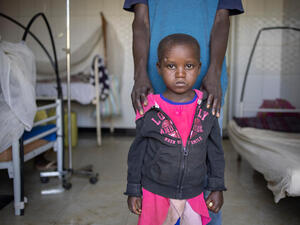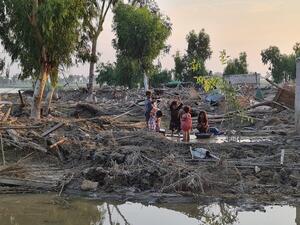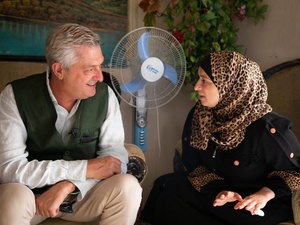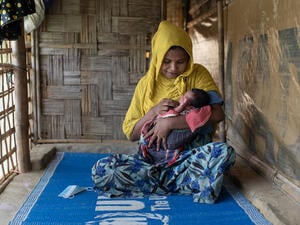UNHCR appeals for funds for emergency in Chad
UNHCR appeals for funds for emergency in Chad

Sudanese refugees living under makeshift shelters in Tine, on the Chad-Sudan border.
GENEVA, Oct 2 (UNHCR) - The UN refugee agency today appealed for $16.6 million in urgent funds to avert a humanitarian disaster on the Chad-Sudan border, where more than 65,000 Sudanese refugees have been living in desperate conditions for months.
The refugees, who started fleeing fighting in the Darfur region of northern Sudan in April, have been encamped in the remote desert of eastern Chad with little food or water, sleeping under makeshift shelters with no sanitation or medical facilities.
"We had to use a supplementary appeal to help people who have gone into very arid areas with no social infrastructure," David Lambo, who heads UNHCR's Africa Bureau, told donors at the agency's annual Executive Committee (ExCom) meeting in Geneva Thursday. "While we understand that the situation in Darfur is now under control, it has not stopped people from fleeing."
The requested funds, which cover the period from October 2003 to December 2004, will go to emergency operations in eastern Chad, where remote locations, poor roads and the harsh climate have prevented aid agencies from establishing a presence so far. Trucks, light vehicles and planes will have to be hired or purchased for transporting refugees, aid workers and relief items. All this is expected to drive up UNHCR's operational costs substantially.
Other challenges include a chronic shortage of food and water in the area, and the danger of epidemics in already overstretched villages nearby. In the absence of readily available sources of water such as rivers, UNHCR will have to drill wells in an area whose water table is on average 100 metres deep. Nearly $1 million from the appeal will go towards the installation of water supplies.
The refugee agency's immediate task is to work with its partners to provide food, water, shelter, sanitation and medical attention for the 65,000 refugees scattered across some 20 sites along the border. The agency has already airlifted relief supplies for 40,000 people to Abéché, a Chadian town some 170 km from the border. But distribution and assistance remain difficult in the harsh terrain unless the refugees can be relocated into four allocated sites.
Other urgent concerns involve refugee protection - ensuring their right to safe and unhindered entry into Chad, as well as the physical security especially of the women and children who make up the majority of the refugees. To meet their basic needs, UNHCR has to mobilise staff to build the necessary shelters and infrastructure as soon as possible.
The bulk of the requested funds will go to transport and logistics, shelter and infrastructure, as well as protection, monitoring and co-ordination in the field.
Presenting the appeal document to delegates at Thursday's ExCom meeting, Ursula Aboubacar, who heads UNHCR's Great Lakes and Central Africa Desk, said the agency would re-establish a presence in the Chadian capital, N'Djamena, following approval by the High Commissioner. UNHCR closed its office in Chad in December 2001.
Aboubacar said that other offices would be set up in southern Chad to monitor assistance programmes for 40,000 Central African refugees hosted there. Two more offices would be established in eastern Chad.
She noted that despite the September 4 ceasefire agreement between the Sudanese government and the Sudan Liberation Movement (SLM) - both parties to the conflict in Darfur - there was no indication of major return movements among the recent refugees.
The appeal for urgent funds has already elicited a response from the United States government, which this week contributed $712,972 towards the emergency in Chad. This figure is part of the US government's fresh contribution of $13.1 million to UNHCR, bringing its total contribution to the agency for the year to $307,228,947, the highest annual amount ever from the US government.
Some $10 million of the latest US contribution will be used for the Iraq emergency while several other countries such as Azerbaijan, Kenya and Uganda will receive smaller amounts for specific refugee programmes.
Updating the ExCom on other operations in Africa, UNHCR's Lambo said the agency was closely watching the evolution of various peace initiatives that could lead to peace in countries such as Burundi, Sudan and Somalia.
"We are keeping our fingers crossed that things will work out in Sudan," Lambo said, noting that UNHCR had already begun planning for the possible return of more than half a million Sudanese refugees in surrounding countries.
The Director of the Africa Bureau said the transitional process in the Democratic Republic of the Congo (DRC) had also given hope for the return of refugees. While the situation in the Kivu region of eastern DRC remained fragile, Lambo said there was no reason refugees could not go home, in a phased manner, from Zambia to the Katanga region, south-western DRC, and from Republic of Congo to Equateur province in the north-west.
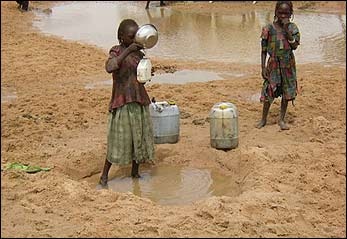
Drinking from stagnant pools in Birak, another border site hosting an estimated 15,500 refugees.
While the Burundi peace process had its "ups and downs", Lambo said the refugee agency hoped to open additional access routes to expand its organised return programme to southern Burundi. This expansion would be on a limited scale, he said.
Meanwhile, in other ExCom developments, UNHCR's governing board on Thursday approved the agency's revised 2003 budget, setting the total needs through the end of this year at $1.15 billion, while also putting the agency's 2004 budget requirements at $955 million.
The 54th session of the Executive Committee will close on Friday.


